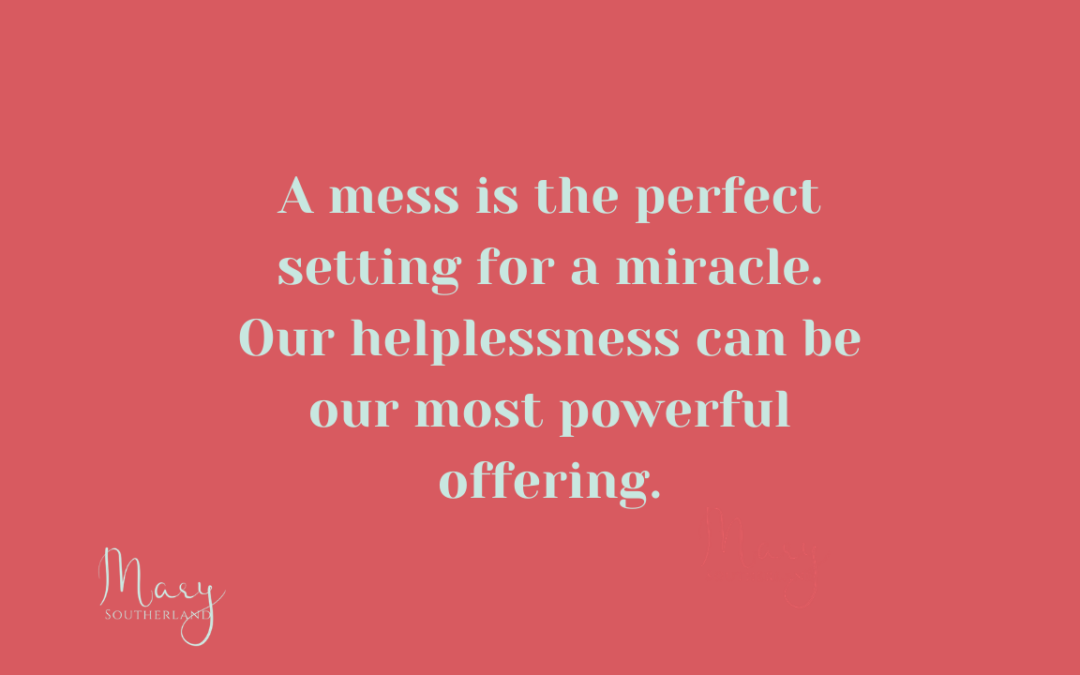Some time later, Jesus went up to Jerusalem for one of the Jewish festivals. Now there is in Jerusalem near the Sheep Gate a pool, which in Aramaic is called Bethesda and which is surrounded by five covered colonnades. Here a great number of disabled people used to lie—the blind, the lame, the paralyzed. One who was there had been an invalid for thirty-eight years. When Jesus saw him lying there and learned that he had been in this condition for a long time, he asked him, ‘Do you want to get well?’ (John 5:1-6, NIV).
A mess is the perfect setting for a miracle. Our helplessness can be our most powerful offering – if we are willing to be honest and transparent. Sometimes it is a lot easier to just stay in the darkness than it is to struggle toward the light.
Not everyone really wants to be healed or rescued. Why?
Because their infirmity has become their identity or because their crisis now defines who they are and forms the familiar parameters of their life. Some people use their weaknesses to get the attention they crave or to keep from assuming any responsibility in their own lives.
Take the man at the pool of Bethesda for example.
The pool of Bethesda was the gathering place for anyone in need of healing. Many people believed that the first person in the pool after the water moved would be healed from whatever disease or illness they had. Since the pool was fed by springs, it is safe to assume that the water was stirred fairly often.
Jesus saw the man lying there and asked what some might consider an unusual question, “Do you want to get well?” The question was a valid one.
Was the man comfortable in his pain or was he willing to pay the price that healing requires? Was he ready and willing to do whatever Jesus asked him to do in order to be healed? Jesus wanted to know. He wanted to know if the man was helpless enough.
The man had been an invalid, unable to walk or stand, for thirty-eight years. The pool of Bethesda may have been his last hope. Scripture doesn’t tell us exactly how long the man had been at the pool … but it was long enough.
“I have no one to help me into the pool when the water is stirred,” the man replied. “While I am trying to get in, someone else goes down ahead of me.”
That was all Jesus needed to hear.
“Get up! Pick up your mat and walk,” Jesus said, and the man was immediately healed.
Notice that Jesus did not offer to carry the man to the pool. Jesus told the man to do what he had been unable to do for thirty-eight years – stand up and then walk. And the man had a choice to make. Every time we ask God for help, we have to make the same choice.
Are we helpless enough?
Are we ready to believe God and do what we have been unable to do on our own?
Are we willing to obey Him?
The man at the pool of Bethesda was healed the moment he looked into the eyes of Jesus and chose to receive the healing he saw waiting there.
There were many people at the pool that day – people who were paralyzed, people who were blind or sick or lame. But Jesus healed only one of them. He did not empty the five porches around the pool, healing everyone. He could have, but Jesus looked out over the crowd and chose to heal the most helpless man – the man who was honest about his pain, the man who was willing to believe God in the hard times.
Can you see yourself in this man? Have you been paralyzed by the pain of loss or rejection? Have friends betrayed you and left you lying by a pool of crushed hopes and dreams?
Jesus sees your helplessness. He knows your heart and hears your desperate cry. Today is the day.
Do you want to be healed?
Mary


Recent Comments